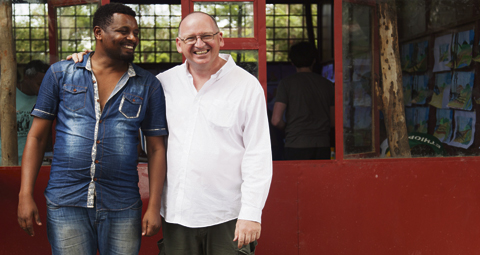BY Ian Dunn | March 25 | ![]() 0 COMMENTS
0 COMMENTS ![]() print
print

Our father
IAN DUNN’S final report from Ethiopia in support of the 2016 SCIAF Wee Box Appeal looks at the work of Fr Paddy Moran
You wouldn’t walk past Fr Paddy Moran without noticing him. Six-and-a half-feet tall, and nearly half that across, but still his frame struggles to contain such a boisterous personality. The priest stands out in his native Dublin, Ireland, so in his adopted home of Aber Minch prison in Southern Ethiopia you could likely spot him with a satellite. A big man yes, but he is dwarfed by the legacy he left in this remarkable prison.
An Irish Spiritan missionary, Fr Paddy (above right) was chaplain to the prison in Ethiopia for more a decade before he recently returned to Ireland. His work there was supported by the Cafod, SCIAF and Trocare office in the country and I met him when visiting SCIAF projects in the African country.
The Irish priest gave a tour of the prison, which seemed more like a small, enclosed town. There was a school, a market, several different little industries. It wasn’t like any prison I know of, not least because there were a lot of children there.
“So it was originally meant to accommodate 1200 people but now there is over 2400 most of which are male prisoners,” Fr Paddy told us. “There is a tradition whereby female prisoners have the right to have their children with them and so we will see the kids in the section with their mums. The rest of the kids tend to be a few months up to about 8.”
Most of the women in the prison have been convicted of murder. Their toddlers clung to them regardless.
“The work of the Catholic Church has been to provide every woman and every child with a bed,” Fr Paddy said.
“Previously they were sleeping on the floor and on sacks filled with grass. There was also no ventilation in the rooms and that has been a project that we’ve done as well. At the end we’ve also installed the toilet and shower block. One of the first things we asked permission for was to make beds for the women. These are made by prisoners for prisoners. That’s how we have done a lot of our work.”
Moving on to the male section in the prison, there was an incredibly range of activities. Men weaving, creating, cooking—even four barber shops.
“I don’t want to be known as the priest who brought the sheep into the prison but I am,” the priest said, laughing. “This is the sheep fattening programme that was started by the Catholic Church. When it comes to the feast days, these lads sell [the livestock] for a huge price. It’s extremely successful and then the prisoners share the profits.”
All through the prison tour Fr Paddy is laughing, but the idea that prisoners should work is something he takes extremely seriously.
“As a fundamental principle, people should not be sent to prison for punishment,” he said. “The punishment is the loss of liberty. So within prisons, the responsibility of us as society is to ensure that this represents mainstream society in so far as possible. In mainstream society we have access to education, to healthcare, to employment and to a dignified standard of living.”
It seems to work.
We see a small group of men carving remarkably ornate wooden coffee sets with small, sharp chisels.
The priest beckons one of them over and has him show us the tool, a stubby handle, a dirty but sharp metal point (below).
“This is how they work it,” he said. “And this is real trust. Show this in a Scottish prison and the commander would drop dead. This is respect. If the boys have to have a fight, and it happens rarely, they can’t use weapons.
“It is the first thing they are told. This is the privilege that they give but this involves a lot of trust, a lot of cooperation.”
This level of trust wasn’t always the case in of Aber Minch prison, though.
“When I first came here I was surrounded by four prison officers and had my mobile phone confiscated,” he said. “ What we are looking at here now is that there isn’t a prison officer around us. We are surrounded by prisoners but I can tell you we are probably in the safest place in Aber Minch. And if the balloon goes up, I’ll be seeking shelter here myself!”
This is still a hard place to be. In a 30ft by 15ft cell there are 155 prisoners, locked in overnight.
“The first change I fought for when I came was for windows, and now all the cells have grates, so a bit of air gets in, because it gets very hot at night,” Fr Paddy said. “And it lets in a bit of light as well.”
In amongst everything else is ‘five worship sites.’
“This is actually a chapel shared by different Protestant denominations,” Fr Paddy said.
“There is also the Jehovah Witnesses, there is also a mosque, there is also an Ethiopian Orthodox church. I have asked continuously if there is any Catholics and I am told there are none.”
He briefly looks a bit downbeat at that, but he soon brightens up
“Even though the Catholic Church is less than 1 per cent of the population of Ethiopia, after the Government of Ethiopia we are the second largest provider of health and education services,” he said. “So the Catholic Church punches well above her weight and the sisters, Mother Theresa’s nuns reach out to 45,000 people every day, most of whom are destitute and abandoned. So we have a lot to be proud of as the Catholic Church.”
Not least the work of priests like Fr Paddy.
As a journalist, I have been in a few prisons in Scotland and Africa. I have never been anywhere as focused on rehabilitation as Aber Minch prison, nor anywhere as focused on helping the people society most wants to forget.
Everybody there, prisoners and staff, said that would not be the case without the relentless work of Fr Paddy.
One of the prisoners, Johannes, put it best.
“The change he has brought here is incredible, he’s not just Fr Paddy, he’s like a true Father to us,” he said. “Before he came we had no hope, now we do. So our name for him, in our language means ‘the light in the darkness.’”
- — [email protected]
- — Pics: Simon Murphy
— http://www.sciaf.org.uk/the-wee-box/











